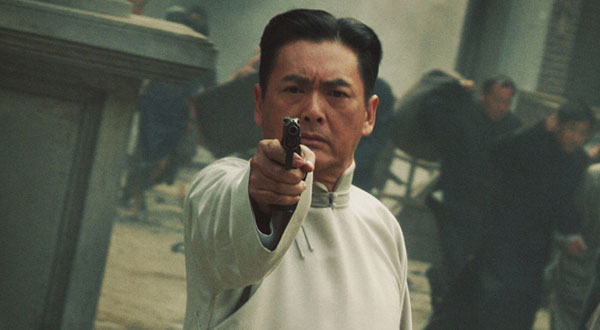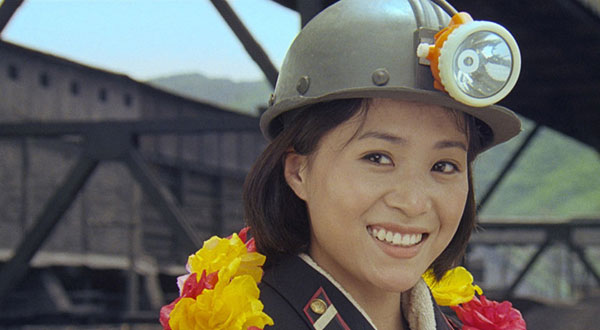Time for yet another NYAFF 2013 rundown, this time featuring the king of Hong Kong cinema himself, along with the a girl power flick from… North Korea?!?!
The Last Tycoon

It goes without saying that Chow Yun-Fat is the first name that comes up for most everybody when discussing Hong Kong cinema’s glory years. For myself, he was certainly the man (along with Jackie Chan) that got me so gaga for Asian movies in the first place. And, as such, it’s also been a bummer to see the HK movie scene… not so much tumble, but simply lose most of its steam (hey, nothing good lasts forever). It’s especially heartbreaking that Chow Yun-Fat’s career isn’t where it once was, nor where it should rightfully be. Which is why The Last Tycoon was basically made for people like myself. To be honest, when it comes to Heroic Bloodshed movies, or MGT (“Major Gangster Tragedies” as the NYAFF calls them), there are definitely better examples out there. Yet for fans of the genre, especially the kind cut from the mid 80s-early 90s cloth, The Last Tycoon could be best described as comfort food. It’s all about Cheng Daqi, who was once a simple country boy that dreamt of making it big in the city, and actually did, by becoming one of Shanghai’s three major triad bosses. Apparently, Daqi is based upon a real person, along with his two compatriots, all of whom Chinese history books have conveniently forgotten about.
The movie constantly cuts back and forth in time; initially we meet young Daqi, played by Huang Xiaoming (who kinda/sorta looks like a fresh faced Chow Yun-Fat, minus the charm, but it’s not his fault, cuz that’s pretty much an impossible task for any actor) who is wrongfully sent to death row. Thankfully his cellmate is Mao Zai, played by the always awesome Francis Ng, and the second of the three aforementioned godfathers. He not only busts Daqi out, but also provides him his first chance to kill a guy. Once back home, Daqi discovers that the girl of his dreams has left for Beijing while he was in slammer, so with no real reason to stick around, Daqi decides to finally pursue his dreams in Shanghai. There he becomes a street punk, and almost immediately rises up the ranks, eventually nabbing the attention of Hong Shouting, portrayed by the always amazing Sammo Hung. Who, aside from being the police captain, is also the criminal kingpin, plus the third and final big boss (back then, the people who upheld the law and broke them were often one and the same). Daqi and Hong eventually becomes bros, and eventually Mao enters the picture, with the three of them doing business together, like one big happy family. With his career in tip-top shape, Daqi decides to find the love of his life, and succeeds, but she totally freaks out when there’s an attempt on his life. It’s a bit understandable, being reunited with the man of your dreams after so many years, and then being a hostage less than ten minutes later. Thankfully Daqi already kinda/sorta had a gal pal anyway, and after getting rejected by girl #1, he decides to really give it a try with girl #2, who’s already head over heels for the dude to being with.
Many years pass and Shanghai couldn’t be healthier, until the bad guys rear their heads, which comes in the form of the Japanese Imperialist Army (naturally). Daqi discovers that there’s a local who has is a vital part of the Japanese’s initiatives, so it’s probably a good idea to kill though the dude, except his wife is Daqi’s childhood crush who all of sudden crashes the party. At this point, the constant back and forth in time is replaced by several love triangles all happening at once, involving Daqi, Daqi’s current flame, Daqi’s unrequited love, Hong’s wife, Hong’s concubine, Hong himself, and I believe Mao also. The Last Tycoon has pretty much every classic Hong Kong cinematic trope you can think of: bad guys acting good guys, the horror of seeing someone turn on his sworn brother, the joys of discovering that a turncoat is actually a good guy after all, guns that shoot an endless amount of bullets (except for one, to prove that the film is somewhat based in reality), plus Chow Yun-Fat killing like 500 people at once and not getting a single drop of blood on his all white suit. Sorry, but there’s no slow-mo shots of doves flying away I’m afraid. On one hand, even though it seems like a decent introduction to the genre to total newbies, I would have to recommend more classic fare like A Better Tomorrow or The Killer, but for veterans of the genre, who have seen both aforementioned movies a thousand times, even though you’ve been there/done that, it’s a fun throw back as previously stated. Sadly, it’s lone screening has just past (apologizes for not having my review ready in time), but I have a strong feeling that it’ll find distribution sooner than later.
Comrade Kim Goes Flying

Not only is Comrade Kim Goes Flying the first North Korean movie that the NYAFF has ever screened, it might also be one of the few North Korean movies to be shown in North America, period. Almost nothing is known about the country other than what the news, that VICE documentary, and Team America tells us. Though here’s a fun-fact: my mother was originally from North Korea. After the Korean War ended and the government took over the family business, herself along with all her siblings, led by their mother, all left Pyongyang to traverse the wilderness, to escape to the south. Long story short, everyone has no doubt heard that things in North Korea are both harsh and weird. But it all compares to the stuff I’ve been told, which is literally a million times worse and stranger that what’s been reported. Trust me on this. So with that in mind, I was especially eager to see a flick that supposedly had very little political agenda to push, but instead was all about girl power.
Comrade Kim Yong-mi is a coal miner’s daughter who loves acrobatics, much to her dad’s chagrin. When she finally gets an assignment in the big city, working on a major construction project, the first chance she gets, Kim attends the circus. That’s where her hero, trapeze artist Ri Su Yon, performs. And not only does Kim get to witness Ri’s magic firsthand, but she also gets to meet her backstage, and is even encouraged to audition for a slot herself (especially since Ri is getting a bit too old to perform much longer). Unfortunately, Kim totally flops; she only discovers right then and there that she has a fear of heights, and as such is made fun of by Ri’s partner, Pak Jang Phil. He states that Kim belongs on the ground and not in the air, plus how all miners suck in general (more or less). But Kim is determined to prove the douchebag wrong, and her boss at the Construction Brigade lends a hand as well, by helping Kim overcome her fear of heights, and also motivating her to follow her dreams (he too was insulted by the assertion that a miner can’t do what a circus star does, because she’s part of the working class, like he is, and if they put their mind to it, they can do anything, etc).
To the point that he gets everyone else in the construction crew to learn tricks of their own, for the upcoming Worker’s Festival, in which Kim would be the star of their show. Which goes off without a hitch; not only is Pak forced to eat his own words, he also begins to realize that he’s in love with Comrade Kim! Though next thing you know, she’s back home. Pak follows, in hopes of convincing Kim to give the circus another shot, but she’s perfectly content to live a modest life, simply entertaining her co-workers. Which is why Pak calls in the big guns (i.e. various government officials), who all state that it’s Kim’s responsibility to perform, for the benefit of all of North Korea (and Glorious Leader, despite not being stated as such). Comrade Kim Goes Flying does not shove North Korea propaganda down one’s throat as expected, or at least in a flagrant manner. But it’s definitely there, in a much subtler manner than expected. Furthermore it illustrates a very idealized version of the country and people, which the one of the directors, Nicholas Bonner (who was on-hand for the screening), readily admitted was the point. The colors of the North Korean countryside pop out at you in a very Technicolor-manner, far more so than IRL. The streets are also filled with cheerful people, all totally content with life, a stark contrast to what many people expect the average North Korean citizen to be.
Bonner (who co-wrote and co-directed the movie, along with Belgium and British partners) detailed the five-year odyssey it took to make Comrade Kim Goes Flying happen. Which was a real challenge, given that the only thing the North Korean film industry produces are, not surprisingly, in your face political dogma, instead of a feel good story about the underdog beating the odds, the type of stuff classic Hollywood used to produce. And even though it’s super thin when compared to girl power flicks that we see here in America, it totally pushes the envelope in North Korea, along with various buttons. Like how Kim actually lies to sneak past the security guard to see the circus! That’s pretty progressive stuff, as well scandalous. Speaking of, guess how far Kim and Pak go, when it comes to their romance? Do they at least kiss? Hell no; at best Pak lightly touches Kim’s hand, which apparently is super hot and heavy by North Korean standards. But Comrade Kim Goes Flying as whole is a start, for a nation that could use big screen heroes and heroines to live vicariously through, the kind that celebrates individual feats, even if there’s a nationalistic slant layered on top of everything (which simply can’t be avoided). It’s apparently on tour at the moment, across the globe (as well as back home, playing in community movie houses, which are a staple of the farm country), though a DVD or digital release is a possibility, given that the filmmakers are determined to demystify North Korea.
